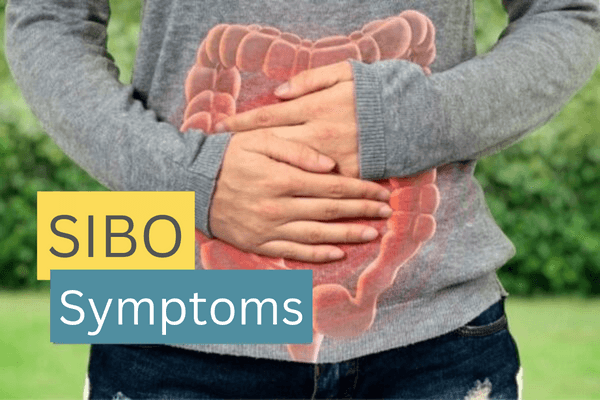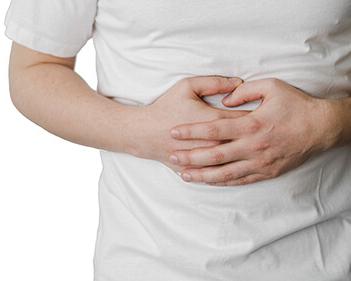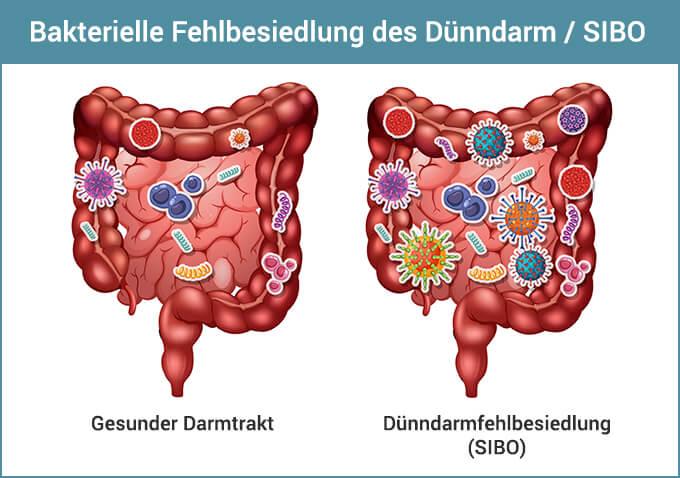
SIBO (Small Intestinal Bacterial Overgrowth) is a topic that is receiving more and more attention in the world of health and nutrition. Although it has been known for some time, SIBO symptoms are often overlooked and not properly diagnosed.
SIBO, also called Small Intestinal Bacterial Overgrowth, is a disorder of the small intestine. The small intestine, which is poor in germs, is overgrown by colon germs, which can lead to a variety of symptoms, e.g. flatulence, abdominal pain, diarrhea, etc. The causes of SIBO can be varied and it can also occur in conventional medical diseases such as Crohn’s disease with small intestine involvement or celiac disease.
In the following article, we will take an in-depth look at SIBO and find out how to recognize SIBO symptoms and how to treat them naturally.
Table of contents
What is SIBO and what does Small Intestinal Bacterial Overgrowth mean?
Under normal circumstances, most bacteria reside in the colon and help digest food as well as absorb nutrients. In contrast, the small intestine should be relatively low in bacteria to allow effective digestion.
However, when too many bacteria enter the small intestine, they begin to consume nutrients from food before they are absorbed by the body – this can lead to bloating, cramping, diarrhea and other digestive problems and is called SIBO. In addition, the bacteria can produce gases that the body absorbs and these can then have negative health effects (e.g., trigger and maintain inflammatory response).
SIBO refers specifically to a colonization of the small intestine with those species of bacteria normally found predominantly in the large intestine. Bacterial overgrowth in the small intestine may also be associated with other factors such as food intolerances, antibiotic use, or previous bowel surgery.
In the case of SIBO there is a risk of significant digestive and health effects. It is therefore important to seek appropriate diagnosis and treatment to relieve symptoms and reduce the risk of long-term complications.
YouTube video about SIBO (German)
The video is loaded from YouTube and played back after clicking Play. For this purpose, your browser establishes a direct connection to the YouTube servers. Google’s privacy policy applies.
What could be the causes of SIBO?
SIBO occurs when bacteria normally present in the colon enter and colonize the small intestine. This leads to an abnormally high population of bacteria in the small intestine, which can cause gastrointestinal symptoms.
There are several factors that increase the risk of bacterial overgrowth in the intestine. Here are some possible SIBO causes:
- Small intestinal motility disorders: If the muscles in the small intestine do not function properly, this can lead to more bacteria settling in the intestine.
- Food intolerances: If incompatible food components remain in the small intestine, they are fermented by bacteria and must be looked at as a possible cause. Read also: SIBO diet plan (here you can also find a SIBO food list PDF for free download)
- Irritable bowel: Anyone who generally suffers from a sensitive bowel or a sensitive intestinal mucosa and notices symptoms of an irritable bowel, should also have SIBO clarified.
- Constipation: Constipation in the intestine can lead to increased formation of bacteria (especially in methane-type SIBO = IMO).
- Operations in the gastrointestinal tract: Operations (e.g. resection of the ileocecal valve between the small intestine and the colon) often result in anatomical changes that can impair intestinal motility and promote the colonization of bacteria in the small intestine.
- Medications: Certain medications, such as antibiotics and acid blockers, can disrupt the balance of intestinal flora and increase the risk of SIBO.
- Immunodeficiency: If the immune system is unable to successfully fight bacteria, this can lead to an increased number of small intestinal bacteria.
- Chronic diseases: Chronic diseases such as Crohn’s disease or celiac disease increase the risk of intestinal malabsorption in some patients.
There are many other factors and possible causes that can increase the risk of developing SIBO. If you suspect you have SIBO, you should contact an experienced physician for advice and treatment.
What are the most common SIBO symptoms?

If you feel that you are suffering from intestinal problems, this could indicate small intestinal malabsorption. Bacterial overgrowth and miscolonization of the small intestine can lead to a variety of symptoms that vary from patient to patient. Here are some SIBO symptoms to watch out for:
- Abdominal pain: a fairly common symptom of small intestine bacterial overgrowth. The pain is often crampy and spreads throughout the abdomen.
- Bloating and flatulence: Also very typical SIBO symptoms. There may be increased formation of gas and a rumbling in the abdomen.
- Diarrhea and constipation: small intestine bacterial overgrowth / SIBO can cause diarrhea, but also constipation. Constipation is more likely to occur with a methane-type SIBO (IMO) and diarrhea with a hydrogen-type SIBO.
- Weight loss: Patients with small intestine bacterial overgrowth often lose weight because their intestinal flora is unable to effectively absorb nutrients from food.
- Fatigue and exhaustion: another symptom of SIBO!
- Food intolerances: If you suddenly become sensitive to certain foods, this may be an indication of bacterial overgrowth in the small intestine. SIBO symptoms such as stomach pain, bloating and diarrhea after eating certain foods are common.
- Anemia: Poor absorption of vitamins and minerals in the intestine can lead to anemia, which causes symptoms such as fatigue, weakness and shortness of breath. This is often due to an iron deficiency or a folic acid or vitamin B-12 deficiency. These important nutrients are largely absorbed in the small intestine.
- Secondary lactose intolerance and fructose malabsorption may occur, as well as disturbances in histamine degradation with symptoms of histamine degradation disorder or histamine intolerance (50-70% of diamine oxidase is produced in the small intestine).
Do you suspect you have a maldistribution of your gut bacteria? Symptoms of this make themselves felt in a similar way to those suggestive of SIBO.
SIBO symptoms: At night too?
Yes, it is possible that symptoms of small intestine bacterial overgrowth (SIBO) also occur at night. Generally, symptoms can occur at any time of day and may be more noticeable in some people, especially at night.
Some of the most common symptoms of SIBO, such as abdominal pain, bloating and diarrhea, are often noticeable during the night and interfere with sleep. Bloating can also occur at night and cause you to feel uncomfortable and have difficulty falling asleep.
Diarrhea can also disrupt sleep and make you feel tired and exhausted. If you have SIBO symptoms at night, it is important to initiate appropriate treatment.
SIBO diagnosis by breath tests
To diagnose SIBO, a solution is first ingested that can only be decomposed by intestinal bacteria to form hydrogen and methane. The concentration of these gases in the exhaled air is then measured at regular intervals and sent to the laboratory. There, the values are evaluated very precisely (in ppm) to make a SIBO diagnosis.
If the gas content in the breathing air increases within 120 minutes, this indicates a SIBO. Measuring the concentration and timing of the increase also allows the location of the bacteria in the small intestine to be determined. If the test is positive, treatment may be recommended by us.
Learn more about our SIBO breath tests
Irritable bowel & SIBO
When it comes to irritable bowel syndrome or SIBO, confusion can easily arise: A thorough examination is always necessary, differential diagnoses must be clarified, and a medical examination must be performed. Basic diagnostics should have been performed (gastroscopy with sampling, colonoscopy if necessary, laboratory). It is believed that 2 thirds of irritable bowel patients suffer from SIBO, and thus there is a treatable cause here. Of course, the causes of bacterial overgrowth and/or irritable bowel syndrome must be clarified. Successful treatment of SIBO often leads to improvement in IBS symptoms.
It is important to note that the treatment of SIBO and IBS symptoms requires an individualized approach and may vary from case to case.
How should a SIBO be treated? Is natural treatment possible?
If you have symptoms and signs of small intestinal overgrowth and malabsorption and SIBO is suspected, it is important to identify the underlying cause to find appropriate treatment. There are several ways to treat SIBO, including conventional medical treatments and natural treatments. We will deal with this in the following:
Bacterial overgrowth in the small intestine: What therapy does conventional medicine recommend?
The conventional medical small intestine bacterial overgrowth therapy to treat patients with SIBO is as follows: The main points of a therapy of SIBO include first the use of antibiotics to kill the bacteria in the small intestine. However, this treatment can have unwanted side effects and can also cause symptoms to worsen if used for too long or in too high doses.
Is herbal therapy more effective than antibiotics for SIBO?
An alternative and more natural treatment for small intestine bacterial overgrowth can be a combination of dietary changes (LOW FODMAP diet =.> What is a FODMAP diet?) and natural remedies. Such treatment usually helps reduce the growth of unwanted small intestinal bacteria while promoting digestive health. Feel free to use our free SIBO food list for download.
If leaky guy syndrome is present, i.e. increased intestinal permeability, we primarily stabilize the intestinal barrier with natural substances. We also use so-called biofilm disruptors.
Natural remedies that can be used to treat SIBO include herbs such as oregano oil, neem, berberine, ginger, turmeric, garlic and basil. These herbs have antibacterial and anti-inflammatory properties that help inhibit bacterial growth in the small intestine.
Learn how I can help you with SIBO as a functional physician
Over the years, we have gained a lot of valuable experience in the cause research, symptom recognition, treatment and diagnosis of SIBO. In addition to using natural remedies, we always recommend changing your diet.
For example, we have good experience with the low-FODMAP diet, and according to the available examination results, a gluten-free diet, a renunciation of dairy products or special foods or even a reduced-carbohydrate diet may be appropriate, depending on the patient’s individual needs. It should also be mentioned that natural treatment of SIBO to reduce small intestine bacterial overgrowth may not be suitable for every patient, and the effectiveness of treatment may vary from person to person. A clean and complete diagnosis for both naturopathic/functional and conventional medicine is necessary. We regularly find gaps here, but don’t worry, we are completing the diagnostics.
Contact us!


